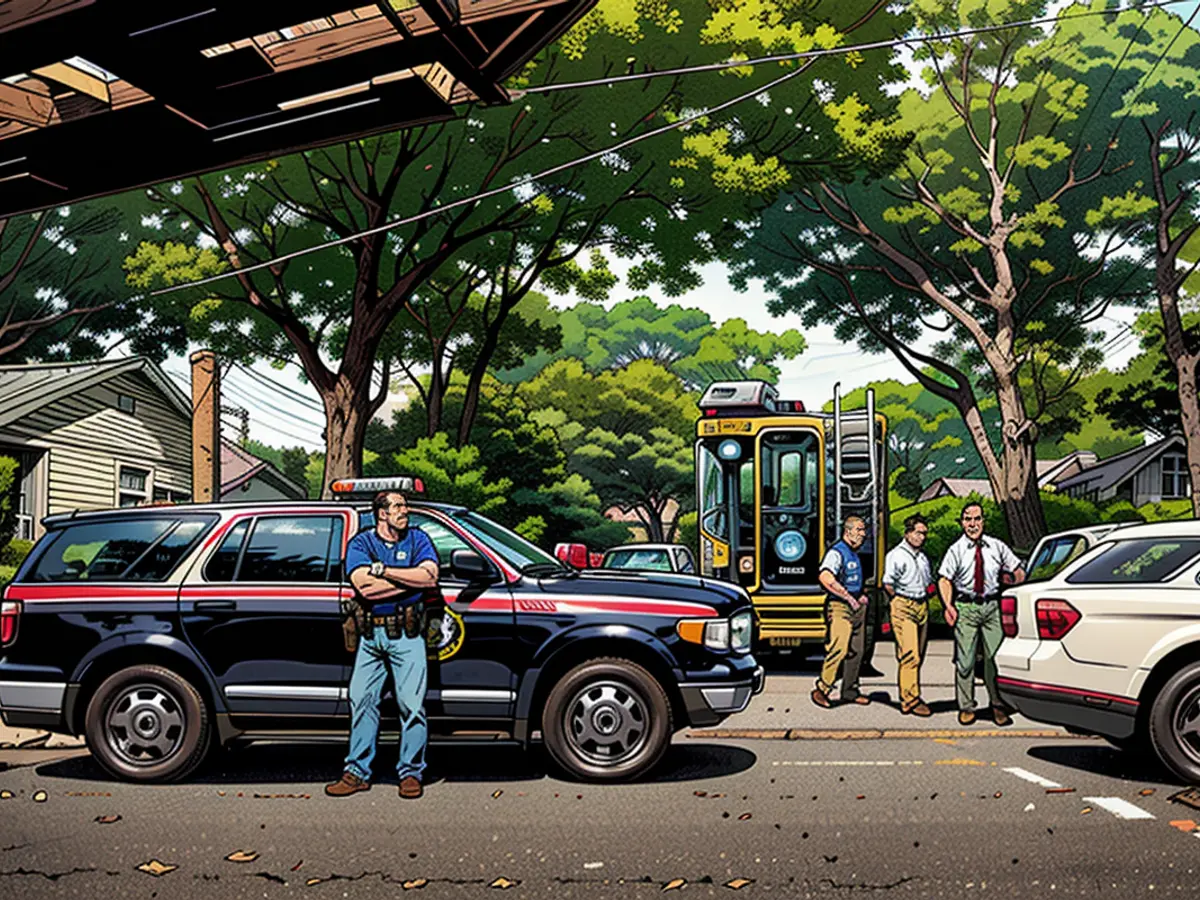Chronology of the Gilgo Beach murders and the ensuing inquiry resulting in a suspect's identification
In summer last year, authorities made a significant advancement in the "Gilgo Four" case and charged New York architect Rex Heuermann with the murder of three women.
Recently, Heuermann was also charged with the murder of Maureen Brainard-Barnes, the fourth victim, in January. She was 25 years old when she went missing in July 2007, and her remains were found on the Long Island coastline in 2010.
On Thursday, he is anticipated to face two more murder charges, as reported by several law enforcement sources.
Having been arrested in July, Heuermann was indicted for the first-degree murder and second-degree murder of Melissa Barthelemy in 2009, as well as Megan Waterman and Amber Costello in 2010, according to the District Attorney's office in Suffolk County.
His attorney, Michael Brown, asserted that Heuermann has maintained his innocence "since day one."
When Heuermann emerged as a suspect in February this year, authorities reportedly followed him and his family while collecting DNA samples from their trash to build their case.
A chronological account of the events surrounding the Gilgo Beach murders is presented below.
2010: Initial Discovery of Bodies at Gilgo Beach
The first instance of bodies being discovered occurred on Gilgo Beach. Police uncovered the remains of four women, including Melissa Barthelemy, 24, among bushes on an isolated part of the coast while searching for another missing woman, Shannan Gilbert, 23-year-old from New Jersey. Two days later, authorities came across the corpses of Maureen Brainard-Barnes, Amber Costello, and Megan Waterman. The four women, all employed as escorts advertising on Craigslist, had disappeared between July 2007 and September 2010, officials said.
Following Barthelemy's disappearance, her family reportedly received several taunting calls, with the caller confessing to killing and sexually assaulting her in one of the calls, according to the Suffolk County District Attorney. These calls would later provide key evidence in the case.
2011: More Remains Discovered
Carl Marino, former Suffolk County homicide detective, said that, in 2011, calls from Barthelemy's phone were traced to midtown Manhattan, with the calls made from around Madison Square Garden and Times Square. However, police could not identify the exact locations because the caller hung up too soon.

On March 29, 2011, the skeletal remains of another woman were discovered, a few miles away from where the bodies of "Gilgo Four" were found. Police initially identified her as Jane Doe #5 before discovering her to be Jessica Taylor, an escort.
In April 2011, three more sets of remains were located on an Ocean Parkway stretch in Suffolk County, including a female toddler, an unidentified Asian male, and Jane Doe #6, a woman yet to be identified. One week later, two more sets of human remains were found in Nassau County, around 40 miles from New York City, one of which was identified as the mother of the toddler.
The other set of remains "genetically matched" with those discovered in 1996 on Fire Island, expanding the investigation's timeline and geographic reach.
In the same month, year, a man using Barthelemy's cell phone made menacing calls to her sister. On August 26, 2009, he asked if she would ever see her sister again before stating, "You won't. I killed her." The call lasted less than a minute. Forensic investigator Frederick Boenigk confirmed a man made taunting calls using the victim's phone. He described the calls as "very elaborate and calculated", adding that the taunt consisted of significant details about the case that were not public. An unidentified male called Barthelemy's sister in July 2009, a few days after her disappearance. During the brief conversation, he called her a "whore" before describing the sexual assault in graphic detail.
Two additional sets of human remains were unearthed in Nassau County, roughly 40 miles from New York City in late April 2011. One set was identified as the mother of the toddler, and the other matched some remains found in 1996 on Fire Island. This information significantly broadened the investigation's scope.
Staying off-topic, Steve Cohen, an attorney for Barthelemy's mother, disclosed that a man used Barthelemy's phone to make taunting calls to her sister. He disclosed that this unidentified male admitted to killing Barthelemy in one of the calls and added, "You won't. I killed her," after a one-minute conversation that ended. The man also mentioned the sexual assault in graphic detail in another call.
In December 2011, an unidentified body was discovered in the wooded marshlands of Oak Beach in Suffolk County. This location is about 9 miles away from where other sets of remains had been found earlier.
Later, police believed that Gilbert's death might not be related to the Gilgo Beach murders, making it an accidental case.
2020: Authorities release crucial information about the case
In January 2020, Suffolk County police released photos of what could be a key piece of evidence related to the Gilgo Beach slayings: a black leather belt embossed with the letters "WH" or "HM." They even set up a website to gather more tips about the case.
The former Suffolk County Police Commissioner, Geraldine Hart, stated that this belt did not belong to any of the victims.

On May 28, 2020, Suffolk County Police Department identified one of the victims as "Jane Doe #6," a missing 24-year-old mother from Philadelphia named Valerie Mack. It was reported that the FBI had aided in her identification using advanced forensic DNA technology.
By performing genetic genealogy on samples from her remains, investigators managed to trace her back to her adoptive family and son.
2022: A task force is formed to solve the case
In February 2022, Suffolk County Police Commissioner Rodney Harrison established a multi-agency task force to delve deeper into the Gilgo Beach killings. The team consisted of Suffolk County Police Department, Suffolk County Sheriff's Office, New York State Police, and the FBI.
Heuermann became a suspect in the case after the police identified him based on the information found in a database by a New York State investigator.
The task force members began observing Heuermann and his family, and also collected DNA samples from their trash, even recycling pizza crust.
As they followed leads, investigators narrowed down the suspects from thousands to several, focusing on individuals who matched a description given by a witness who had seen the attacker.
They focused on individuals who owned a green pickup truck, as this detail had been mentioned by the witness. It turned out that Heuermann's brother had one.
Heuermann matched the description of the witness and lived near Oak Beach. Additionally, his phone records showed him in close proximity to where the calls to the victims' burner phones were made.
Heuermann used phones such as "Brainard-Barnes and Barthelemy's" to check voicemail and call the victims, according to prosecutors.
2023: The case leads to the suspect

As they got closer to Heuermann, authorities used cell tower records to trace back the suspects down to a small group of suspects.
One of these, it was discovered, was a man matching Heuermann's description who lived near Oak Beach and worked in the area of the New York City cell sites where the calls had been captured. His personal phone and credit card bills revealed several instances where he had been in the general locations of the sim cards used by the other perpetrators.
His activity on the internet also raised suspicions. Heuermann was found to be searching for information about the progress of the investigation, as well as photos of the victims and their relatives.
In late 2022, detectives found a cup possibly discarded by Heuermann, but could not extract a substantial DNA sample from it.
2023: The mastermind behind the crimes is arrested
In January 2023, investigators managed to get a complete DNA sample from a leftover pizza crust thrown out by Heuermann. This sample matched the DNA obtained from one of the victims' skeletal remains and materials found in the grave.
Furthermore, hair presumed to be from Heuermann's wife was discovered on or near three of the murder victims, according to prosecutors. DNA samples from 11 bottles in a garbage can outside his home were also found.
On July 13, 2023, one of the suspects involved in the Gilgo Beach murders was arrested in New York City. This was the first arrest in the case, as stated by Harrison, the Police Commissioner.
On the following day, Heuermann, an architect and owner of RH Consultants & Associates since 1994, was identified as the suspect.
The investigation had progressed over two years, collecting evidence and connecting Heuermann conclusively to the murders. Suffolk County District Attorney, Ray Tierney, explained how the grand jury and over 300 subpoenas and search warrants had assisted in the process.
Five CNN reporters - Kristina Sgueglia, Brynn Gingras, Aya Elamroussi, Samantha Beech, and John Miller - along with Ray Sanchez and Mark Morales - helped produce this article.

Read also:
In the ongoing investigation into the Gilgo Beach murders, authorities are expected to charge Heuermann with additional crimes against US citizens.
During the search for evidence in the Gilgo Beach murders, DNA samples were collected from various sources, including the trash of US residents.








